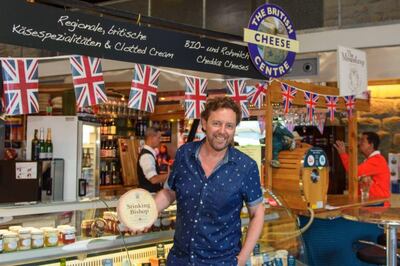After decades trading under special arrangements with its western European neighbours, the British exit from the EU initially appeared to offer Switzerland a host of new possibilities.
The EU ambassador to Switzerland, Michael Matthiessen, said in August that it could be a “window of opportunity” for the country. “In the middle of Brexit, with the 60th anniversary of the Treaty of Rome and a worrying geopolitical situation, it's maybe a good moment for the EU and Switzerland to draw closer together,” he said.
And at first glance Switzerland looks poised to reap the benefits of a European Union rejig, potentially enjoying better links to the bloc than Britain after its departure. However, a special conference hosted by PWC recently heard a welter of challenges faced by industries such as pharmaceuticals as well as small expatriate businesses and schools.
The landlocked country known for cuckoo clocks, chocolate, cheese, watches and neutrality has been touted by some British Brexit-supporting politicians as a perfect example of a European country thriving outside of the EU.
Despite being involved in negotiating the European Economic Area (EEA) agreement with the EU, a referendum held in 1992 rejected Switzerland’s EEA membership and effectively put paid to any hopes of the nation joining the EU.
A quarter of the century on from the “no” vote, Bern, the capital, has continued to agree bilateral treaties with the EU nerve centre Brussels, much of which concern the economic relationship between Switzerland and the bloc.
The nation has limited access to the European single market through a free trade agreement but is not in the single market or the customs union. It participates in the Schengen travel area agreement, ending the need for border controls in a nation surrounded by five different countries.
For some this might seem like the “Goldilocks” option for the UK - a country which is seeking more access than that offered by the Canada model but which is unwilling to accept the "free movement of people deal" that comes with the Norway model.
But the “Swiss Brexit deal” is not on offer, according to Professor Christa Tobler at the Institute for European Global Studies at Basel University.
“The European Union is not offering this model for anyone else these days,” she told attendees at a recent event discussing whether Switzerland could be a blueprint for Brexit.
“We [Switzerland] have it because we were lucky as a result of history because it is something that has grown over a long time. While it won’t just be discarded even if the European Union is not happy with it anymore, it will certainly not be offered to another country.
“Quite apart from the fact the UK doesn’t want it either.”
British Prime Minister Theresa May spoke about the need for Britain and the EU to reach a “bespoke” deal in a Brexit speech this month, adding that the UK would not accept “the rights of Canada and the obligations of Norway”.
Although Switzerland is the only nation that has a bespoke deal with the EU and has often been accused of “cherry-picking”, it still has trouble making changes to its own agreements with the bloc.
A successful 2014 referendum launched by the right-wing Swiss People’s Party designed to limit immigration through quotas was never properly implemented by the Swiss parliament. As a result, free movement of people between Switzerland and the EU, which was agreed in 1999 as one of seven bilateral treaties signed that year, continues to this day.
Switzerland has been reluctant to cancel or alter the freedom of movement agreement out of fear the EU will invoke the “guillotine clause”, meaning the other six bilateral agreements, which include deals on agricultural products and research, would be terminated.
Mrs May has consistently said the Brexit vote was a vote to curb immigration from the EU and - with that much-used phrase - “take back control” of the UK’s borders, an outcome the Swiss model currently does not offer.
_______________
Read more:
Credit Suisse notches up another loss
Swiss watchmaker Bucherer acquires US rival Tourneau
_______________
Switzerland is eagerly watching Britain’s approach to carving out a future relations deal with the EU to see what will be offered by the bloc.
In the aftermath of the British referendum, Swiss analysts predicted the UK’s exit would be strategically good for Switzerland - a soon-to-be fellow outsider - in extracting better terms from the EU.
However, the reality is that the Brexit vote has left Brussels even more inflexible than ever, unwilling to compromise with Bern on issues such as immigration and institutional framework agreements, for fear of setting a precedent for the negotiations with the UK.
“I think that Switzerland will not benefit from whatever the UK’s going to negotiate,” says Prof Tobler. “I think there will be no fundamental changes.”

Switzerland, like its EU neighbours, is increasingly concerned about Brexit and the impending March 2019 deadline.
But unlike the EU's 27-member states, Switzerland will not be given the opportunity to conclude any future agreements, including trade or status of its expatriates with London after Brexit, until the UK has formally left the EU.
“It has been disputed whether they can even negotiate them or think about them,” Prof Tobler says. “Even though everybody is thinking frantically, in reality, not much has happened.”
The lack of information about how the status of British nationals will change has also concerned many Brits currently living in Switzerland.
As of 2016, there were 41,000 UK nationals living in the nation, making up 1.97 per cent of the two million strong foreign population.
In just over 12 months, British expats will become “non-EU nationals”. Switzerland has strict quotas for the number of non-EU nationals who are allowed to reside in the country, prompting concerns among the UK expatriate community there.
“Switzerland makes a very distinct difference between EU nationals and non-EU nationals. EU nationals can come and work here,” says Gabrielle Grether, director of Grether MacGeorge, which offers tax, legal and financial advice to English speakers in Switzerland. “There’s a certain number of permits that can be given but the limit is so big, it usually works out.
_______________
Read more:
Swiss money manager Pictet still sees value in global stocks
Nestle plans 400 job cuts in France in cost savings push
_______________
“But for what is called a third-party national, you have to jump through a lot of hoops. You have to prove that you could not hire a Swiss or EU national for the job, you have to prove why you need the job and what you [as a company] will pay the person.”
“After the vote, we had a lot of people calling and asking, ‘Are we going to be kicked out of Switzerland?’”

But Yorkshire-born Michael Jones, who owns the British Cheese Centre in Zurich, is feeling optimistic. "To have a job here as a foreigner, it's going to be a good job," he tells The National. "Switzerland's not going to kick people out who have been living here for five or 10 years and have a job. Although they will certainly put some limits on the UK for new people coming in."
But many other expatriates in the business community are feeling uneasy about what is to come.
Nick Owlett, is the incoming director at ELA Basel, The Swiss British School of Basel, which teaches the UK’s national curriculum to around 300 students.
He tells The National he is worried about how Brexit might affect the numbers of expatriate families moving to Basel as well as how much harder it will be to hire new members of staff from the UK.
“Like many British companies operating in Switzerland, we’re concerned that if there is any kind of uncertainty for the employers about hiring British families, we won’t see the same number of British families coming over,” he says.
“I’ve just hired four new teachers, two I’ve hired locally in Switzerland because they already have work permits to be here. But two are coming from the UK. The worry that I have in the future is how easy will it be to hire British-trained teachers coming from the UK. Will it be bureaucratic and more expensive for us?”
Concerns are particularly high in Basel, which lies in the north-west of the country bordered by both France and Germany and is home to many multinational pharmaceutical companies. A huge player in the Swiss economy, the chemical and pharmaceutical industry generated 4.8 per cent of Switzerland’s GDP in 2016 and contributed to 42 per cent of total Swiss exports.
Irish national Mary D’Arcy Baguley owns CTC Resourcing Solutions, a specialist life-sciences recruitment and training company that supports the pharmaceutical industry in Basel and around Switzerland. She founded the organisation in 1997 while working as a contractor for multinational healthcare company Hoffman-La Roche.
The language of the pharmaceutical industry in Switzerland is English, which explains why around 30 per cent of candidates CTC hires are from the UK.
"Companies tend to like the British because their English is good and they look for people with international experience," Ms D'Arcy Baguley tells The National at her office in Basel.
She says obtaining a work permit for other native English speakers from third party countries such as the US or Australia is “practically impossible” for an agency recruiting for the pharmaceutical industry.
“There’s a quota on the number of external [non-EU] people that the pharmaceutical industry can bring in. They have to prove the candidate has something that is unique to them and they can’t find the equivalent here in Switzerland.”
Ms D’Arcy Baguley says if the UK were to be labelled a third-party country it could cause problems for her company.
“I think potentially it will be difficult,” she says. “Unless we can come to a special arrangement when it comes to the experienced, scientific people that we take in.”
But, like many in the business community in Switzerland, Ms D’Arcy Baguley is hopeful Switzerland and Britain will reach a reciprocal agreement, which will allow life science specialists to obtain work permits in each country.
“In Switzerland there are not enough experienced and scientific people so we need to look outside. And English is the language of the pharmaceutical industry,” she says.
“It’s important that they come to some solution.”


